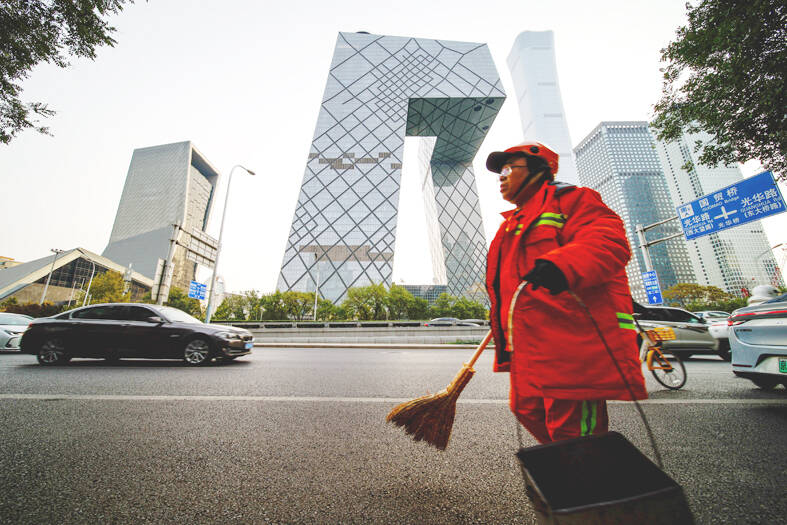Ratings agency Moody’s yesterday downgraded the outlook on China’s credit rating to “negative” from “stable” on the back of rising debt in the world’s second-largest economy.
China’s post-COVID-19 pandemic recovery has been hampered by weak consumer and business confidence, a persistent housing crisis, record youth unemployment and a global slowdown that is weighing on demand for the country’s goods.
Those woes have piled pressure on central and local governments to step in with more financial support following a 1 trillion yuan (US$141.1 billion) sovereign bond issuance by Beijing in October.

Photo: EPA-EFE
Moody’s said its decision “reflects rising evidence that financial support will be provided by the government and wider public sector to financially stressed regional and local governments and state-owned enterprises.”
This was “posing broad downside risks to China’s fiscal, economic and institutional strength,” it said.
The move “reflects the increased risks related to structurally and persistently lower medium-term economic growth and the ongoing downsizing of the property sector,” it added.
China’s vast property sector is mired in a deep debt crisis, with some of the nation’s biggest developers owing hundreds of billions of dollars and facing bankruptcy.
Construction and real estate account for about a quarter of China’s GDP.
Moody’s said it expected the economy to grow 4 percent next year and in 2025, “with structural factors including weaker demographics driving a decline in potential growth to around 3.5 percent by 2030.”
“Substantial and coordinated reforms will be needed for consumption and higher value-added production to drive growth” to offset the diminished role of the property sector, it added.
The Chinese Ministry of Finance said it was “disappointed with Moody’s decision.”
“Moody’s concerns about China’s economic growth prospects and fiscal sustainability are unnecessary,” a ministry spokesperson said, adding that China’s macroeconomy has continued to recover.

TAKING STOCK: A Taiwanese cookware firm in Vietnam urged customers to assess inventory or place orders early so shipments can reach the US while tariffs are paused Taiwanese businesses in Vietnam are exploring alternatives after the White House imposed a 46 percent import duty on Vietnamese goods, following US President Donald Trump’s announcement of “reciprocal” tariffs on the US’ trading partners. Lo Shih-liang (羅世良), chairman of Brico Industry Co (裕茂工業), a Taiwanese company that manufactures cast iron cookware and stove components in Vietnam, said that more than 40 percent of his business was tied to the US market, describing the constant US policy shifts as an emotional roller coaster. “I work during the day and stay up all night watching the news. I’ve been following US news until 3am

UNCERTAINTY: Innolux activated a stringent supply chain management mechanism, as it did during the COVID-19 pandemic, to ensure optimal inventory levels for customers Flat-panel display makers AUO Corp (友達) and Innolux Corp (群創) yesterday said that about 12 to 20 percent of their display business is at risk of potential US tariffs and that they would relocate production or shipment destinations to mitigate the levies’ effects. US tariffs would have a direct impact of US$200 million on AUO’s revenue, company chairman Paul Peng (彭雙浪) told reporters on the sidelines of the Touch Taiwan trade show in Taipei yesterday. That would make up about 12 percent of the company’s overall revenue. To cope with the tariff uncertainty, AUO plans to allocate its production to manufacturing facilities in

Six years ago, LVMH’s billionaire CEO Bernard Arnault and US President Donald Trump cut the blue ribbon on a factory in rural Texas that would make designer handbags for Louis Vuitton, one of the world’s best-known luxury brands. However, since the high-profile opening, the factory has faced a host of problems limiting production, 11 former Louis Vuitton employees said. The site has consistently ranked among the worst-performing for Louis Vuitton globally, “significantly” underperforming other facilities, said three former Louis Vuitton workers and a senior industry source, who cited internal rankings shared with staff. The plant’s problems — which have not

COLLABORATION: Given Taiwan’s key position in global supply chains, the US firm is discussing strategies with local partners and clients to deal with global uncertainties Advanced Micro Devices Inc (AMD) yesterday said it is meeting with local ecosystem partners, including Taiwan Semiconductor Manufacturing Co (TSMC, 台積電), to discuss strategies, including long-term manufacturing, to navigate uncertainties such as US tariffs, as Taiwan occupies an important position in global supply chains. AMD chief executive officer Lisa Su (蘇姿丰) told reporters that Taiwan is an important part of the chip designer’s ecosystem and she is discussing with partners and customers in Taiwan to forge strong collaborations on different areas during this critical period. AMD has just become the first artificial-intelligence (AI) server chip customer of TSMC to utilize its advanced